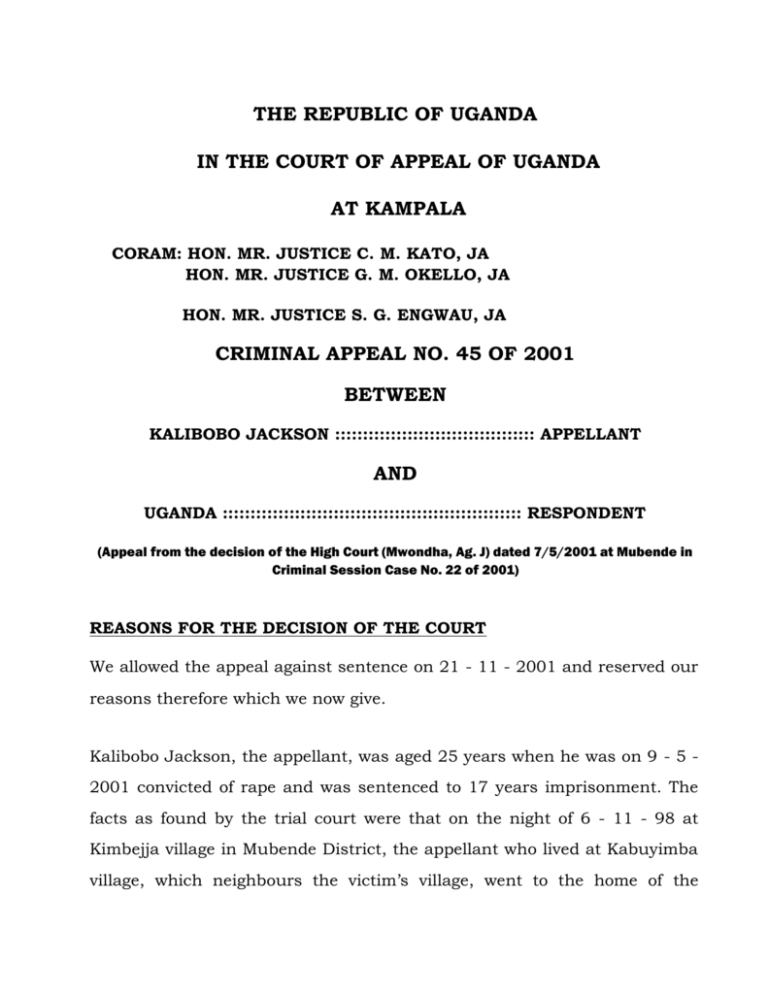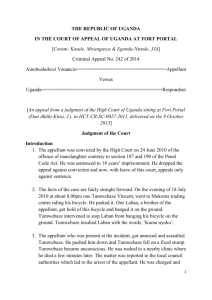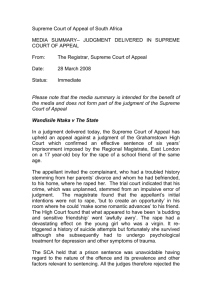Kalibobo v Uganda
advertisement

THE REPUBLIC OF UGANDA IN THE COURT OF APPEAL OF UGANDA AT KAMPALA CORAM: HON. MR. JUSTICE C. M. KATO, JA HON. MR. JUSTICE G. M. OKELLO, JA HON. MR. JUSTICE S. G. ENGWAU, JA CRIMINAL APPEAL NO. 45 OF 2001 BETWEEN KALIBOBO JACKSON :::::::::::::::::::::::::::::::::::: APPELLANT AND UGANDA :::::::::::::::::::::::::::::::::::::::::::::::::::::: RESPONDENT (Appeal from the decision of the High Court (Mwondha, Ag. J) dated 7/5/2001 at Mubende in Criminal Session Case No. 22 of 2001) REASONS FOR THE DECISION OF THE COURT We allowed the appeal against sentence on 21 - 11 - 2001 and reserved our reasons therefore which we now give. Kalibobo Jackson, the appellant, was aged 25 years when he was on 9 - 5 2001 convicted of rape and was sentenced to 17 years imprisonment. The facts as found by the trial court were that on the night of 6 - 11 - 98 at Kimbejja village in Mubende District, the appellant who lived at Kabuyimba village, which neighbours the victim’s village, went to the home of the victim, a 70 years old widow, who lived with her dumb son. He forcefully knocked at her door. The shutter fell into the house. He entered the house and caught the victim. She confronted her assailant with a panga but the appellant overpowered her, removed the panga from her and raped her. She raised an alarm and the appellant, fearing that he might be caught there, ran away with her panga. The matter was reported to the authorities and the appellant was arrested the next day. The panga was recovered from his house. He was taken to police and was eventually indicted for rape contrary to sections 117 and 118 of the Penal Code Act. He denied the offence. At the trial, his defence was an alibi that he never reached the victim's village at the material time. The trial judge rejected his defence, convicted him and sentenced him as stated earlier in this judgment. We granted the appellant the necessary leave to appeal against sentence only as required by section 131 (1) (b) of the Trial on indictment Decree (T.I.D) as amended by the Judicature Statute No. 13 of 1996. Mr. Mark Bwengye, who appeared for the appellant, contended that the sentence of 17 years imprisonment though legal, was manifestly harsh and excessive in the circumstances of this case. He argued that the appellant was aged 25 years when he was convicted, had family responsibility which the trial judge did not consider. He had a wife, two children and two young brothers to care for. In counsel's view, the appellant needed a shorter period in prison to reform. On the other hand. Mr. Tugume Moses, a State Attorney who appeared for the State, contended that the sentence was appropriate in the circumstances of the case as the attack was on an old helpless widow. In his view, the trial judge considered all the circumstances of the case and arrived at that appropriate sentence. He submitted in alternative however, that should the court be inclined to reduce the sentence, it should be brought down to 15 years. It is trite that an appellate court can only interfere with a sentence imposed by the trial court if it is evident that it has acted on a wrong principle or overlooked some material factor or the sentence is manifestly excessive or low in view of the circumstances of the case. See James s/o Yoram vs R (1951) 18 EACA 147. While passing the sentence in the instant case, the trial judge stated:“The offence of rape is a very serious one and becomes more serious if a young man goes into it like the accused. I will assume that he is first offender as the state attorney is unaware of the record. I however, take notice that this offence is so rampant in this area and as court has the duty to protect society, especially members of society of female gender who are so vulnerable. I shall pass a deterrent sentence taking into account the 2years he has stayed on remand. Since the maximum sentence for this offence is death, the accused being a young man can reform. He is therefore sentenced to 17 years imprisonment”. The trial judge clearly passed that sentence because:1. the offence is a serious one and 2. the offence is rampant in that area. We no doubt agree that rape is a serious offence. The prosecutor stated from the Bar that rape of old women, grandmothers appeared to be fashionable in the area, as this was not the first case they had heard. We think that prevalence of a crime in the area should be considered along side the other circumstances of the particular offence in order to impose a sentence that fits the offence and the offender while maintaining uniformity of sentence. Though sentences passed in previous cases of a similar nature are not precedent, they offer materials for comparison. See Ogalo s/o Owoura vs R (1954) 24 EACA 270. In Lugi Sairus vs Uganda, Cr. Appeal No. 50 of 2000, the appellant who raped his neighbour was convicted of the offence and was sentenced to 13 years imprisonment. On appeal, that sentence was reduced to 10 years on ground of its being manifestly so execessive as to cause a miscarriage of justice. In Boona Peter vs Uganda, Cr. Appeal No. 16 of 1997, the appellant was convicted by High Court for rape and was sentenced to 10 years. His appeal against sentence on ground of its being manifestly excessive was rejected by this court which upheld the High Court decision. We think that if the trial judge considered the need to maintain uniformity of sentence, she would certainly not have imposed that sentence. The appellant raped an old lady. That was bad. However, considering all the circumstances of the case, we think that a sentence of 17 years imprisonment was manifestly so excessive as to cause a miscarriage of justice. It is for that reason that we allowed the appeal and reduced the sentence from 17 years to 7 years imprisonment. Dated at Kampala this 5th day of December 2001. C. M. Kato JUSTICE OF APPEAL. G. M. Okello JUSTICE OF APPEAL. S. G. Engwau JUSTICE OF .APPEAL.







